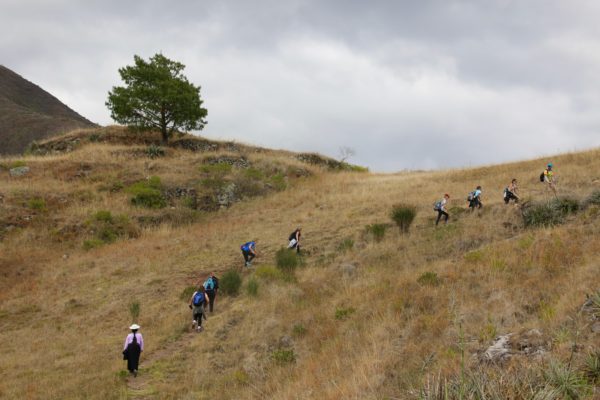Professor Sisa Pacari on Indigenous Communities and Traditional Medicine
Professor Sisa Pacari has been teaching at CEDEI for decades on and off. She is an integral part of the institution.Two of her standout classes are Quichua, the indigenous language of many Ecuadorians throughout the country, and a seminar on Traditional Medicine. During her language course, which has an Intro and Intermediate level, Profe Sisa uses only Spanish and Quichua to teach her pupils the intricacies of this language that has been used in this region before the Spanish arrived. It is the mother tongue of the Incas, a conquering group from the south, who brought uniformity to the difference indigenous communities in what is now Ecuador. The language was one of the ways the Incas were able to extend their empire so quickly, in less than one hundred years, extending from southern Colombia to northern Chile.
Profe Sisa sat down to answer a few questions about her background, sharing her love for teaching and her experience at CEDEI. *This interview has been translated from the original Spanish.
How long have you worked at CEDEI?
I started working at CEDEI in 1992, and worked until 2000. Later, I returned in February of 2014 and am still here, to this day.
Where did you begin your training as professor?
I started to train to become a professor in 1983. Initially, I was preparing to work with children and adolescents from the communities. I worked with the aim of eliminating the discrimination and mistreatment that exists against the mestizos, the indigenous. Later, CEDEI was looking for a professor to teach Cultural Affairs regarding Indigenous Communities; this was at the Educación del Azuay. I went there to give cultural classes, for CEDEI, specifically about indigenous communities: los pueblos nativos.
Describe what it was like growing up in Saraguro.
My childhood and youth en Saraguro was incredible. I was constantly in connection with nature, with the animals, with the people of my community, Chukidel, and our celebrations. I learned to cultivate and care for the land, for its rituals and ceremonies. I learned to spin cloth to make the traditional clothing; I spun some 5 pounds of wool from the sheep to make my own skirt. I learned to weave the sashes in different colors and designs. I have been taught about natural medicine since I was a girl, watching my mother and father use nature to cure. With them, I learned to properties of each plant, as well as its benefits. Later, I studied our medicine to deepen my knowledge. My first professional goal was to study medicine to obtain a degree from a Western university and with this degree, I could practice our traditional medicine without problems of persecution. The Western ideologies don’t always recognize our traditional medicine.The indigenous communities practice medicine with the “title” or blessing received from Pachamama (Mother Earth) and we also learn from our grandparents and the elders.
What do you teach at CEDEI?
I teach Spanish language, Andean culture, Andean literature, History and Civilization of Latin America, the Conquest and Colonization of Latin America, and Kichwa (Quichua). Furthermore, I do talks about ancestral, traditional medicine from the surrounding pueblos (communities), as well as talks about indigenous movements, the Andean cosmovisión, or world view, and other things. I love the literature and culture of indigenous communities, as well as the history and focus on civilization and colonization. Through literature, I can explain my culture and our perspective, and I can include some of my native tongue, Kichwa. In history and civilization, conquest and colonization, I can give different points of view about the knowledge, values and successes of the original communities that were invaded by the Europeans.
Why do you think it’s important to study abroad in another country?
It’s important to study in another county because you have intimate experiences with the people of a different culture; you have direct contact with them. There, the knowledge is more practical and real, more so than what you can learn just through books. Even though there’s lots of information in literature about other cultures and peoples, you can’t entirely comprehend the reality, and in some cases, the information in books and articles is distorted and biased.

